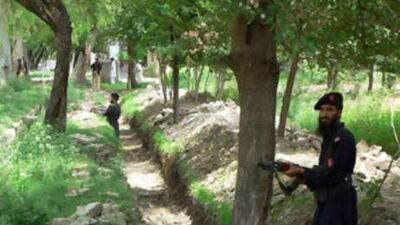ISLAMABAD // Washington appears to be losing patience with Islamabad's ambivalent role in the "war on terror", and the fear in Pakistan is that US forces will intervene to contain extremists in the rugged tribal belt near the border with Afghanistan. Adm Mike Mullen, the US military chief, made a surprise visit to Pakistan on Saturday, carrying what is thought to have been a stern message: deal with militants operating on your side of the border or we will do the job ourselves. In meetings with the Pakistan army chief and then the prime minister, he is also believed to have laid out evidence of elements within Pakistan's security and intelligence apparatus supporting militants in the tribal areas, a known haven for Taliban and al Qa'eda fighters. While Pakistan's government remains in a state of denial over the threat the militants pose, weekend events underlined their growing influence over large swathes of the country's north-west. At least 16 troops were killed in an ambush on Saturday in Hangu, an area in the "settled" parts of the North West Frontier Province, not even the tribal territory that runs along the border with Afghanistan. The shoot-out reportedly included hundreds of militants and was said to have been one of the deadliest for the Pakistan army in years. The United States has said more militants are launching cross-border raids from Pakistan this year, blaming the new government's policy of striking peace deals with the insurgents, and has pressed Islamabad to take action. Just before the visit to Pakistan, Adm Mullen gave a blunt assessment of the situation to reporters in Kabul: "There's clearly not enough pressure being brought to bear, particularly on the Pakistan side of the border. There's more freedom there," he said. And a study last month from Rand Corp, an independent US research organisation, that was commissioned by the Pentagon, found that: "Right now, the Taliban and other groups are getting help from individuals within Pakistan's government, and until that ends, the region's long-term security is in jeopardy." The signs Washington is losing patience are ominous. More US and Nato troops in Afghanistan have been moved close to the Pakistan border, while the aircraft carrier Abraham Lincoln has been moved from the Gulf to the Arabian Sea to support operations in Afghanistan - or Pakistan. US air strikes against militants hiding in Pakistan's tribal zone are more frequent and it now seems that Washington is no longer giving Pakistani authorities notice or sharing intelligence. Ayesha Siddiqa, a security analyst and author of Military Inc, said the fear in the Pakistan army was of a United States-India axis. "The army is uncomfortable with the game that they think that the US and India are playing," Mr Siddiqa said. With the US military presence in Afghanistan and India close's relationship with the government of Hamid Karzai in Kabul, the Pakistan army's fears of encirclement have become real. The recent bombing of the Indian Embassy in the Afghan capital - which Kabul has said was carried out with the help of Pakistani intelligence - may have been a warning. India is Pakistan's traditional enemy. The aim of Pakistan's military strategy has for decades been to ensure that Afghanistan is allied with Islamabad, not New Delhi. The only way of ensuring that now may be a victory for the Taliban. The United States is likely considering its own options to counter the threat, which could include a Special Forces operation in Pakistan's tribal territory. Washington may also try to forge its own alliance with more moderate tribes on the Pakistani side of the border, perhaps in the hope of replicating the "Anbar strategy", in which Sunni tribes in Iraq were armed by America to fight al Qa'eda. In Pakistan, a new civilian government weakened by the disbursement of power between bickering coalition partners, Pervez Musharraf, the president, and the army, has meant that no one is sure who is deciding policy and on what agenda. In the meantime, extremist groups have relaunched a murderous campaign of suicide bombings within the country, while the Taliban's military capability in Afghanistan is growing, with suicide attacks more frequent. Kamran Bokhari, head of Middle East analysis at Strategic Forecasting, a private US intelligence firm, said Pakistan lacked a counter-terrorism policy. "The random oscillation been negotiation and military operation, without any strategic objective, makes it seems as though the people at the helm [in Pakistan] have no idea. They lack capacity and even willingness to deal with it," Mr Bokhari said. The army and the politicians do not have the stomach to fight the militants in a concerted way, but increasingly daring challenges by the insurgents have forced their hand at times. At the same time, they have also sought to sign peace deals with the militants, even though the state is negotiating from a position of weakness and the militants rarely stick by the terms of the deal. The tribal territory is now firmly under the command of various Taliban groups, who are committed to jihad in Afghanistan and willing to turn on Pakistan, should Islamabad try to get in their way. The presence of American soldiers across the border has legitimised the Taliban in the eyes of large swathes of the population in the NWFP and other parts of Pakistan. Should the United States intervene in Pakistan now, the repercussions for both countries would be severe. "It would set the entire country ablaze," Mr Siddiqa said. "Right now, it is a country spinning out of control." sshah@thenational.ae

US threat to flush out militants
Military chief travels to Islamabad to show proof of spy agency's support and issue stern message to curb extremists.
Most popular today
